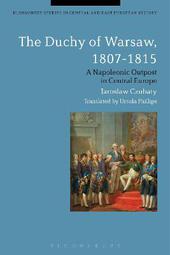
|
The Duchy of Warsaw, 1807-1815: A Napoleonic Outpost in Central Europe
Paperback / softback
Main Details
| Title |
The Duchy of Warsaw, 1807-1815: A Napoleonic Outpost in Central Europe
|
| Authors and Contributors |
By (author) Jaroslaw Czubaty
|
|
Translated by Ursula Phillips
|
| Series | Bloomsbury Studies in Central and East European History |
|---|
| Physical Properties |
| Format:Paperback / softback | | Pages:256 |
|
| ISBN/Barcode |
9781350045613
|
| Classifications | Dewey:943.8032 |
|---|
| Audience | | Postgraduate, Research & Scholarly | |
|---|
|
Publishing Details |
| Publisher |
Bloomsbury Publishing PLC
|
| Imprint |
Bloomsbury Academic
|
| Publication Date |
24 August 2017 |
| Publication Country |
United Kingdom
|
Description
The Duchy of Warsaw, 1807-1815 is the first academic history of the state established by Napoleon in pre-partitioned Poland at the turn of the 19th century. The book examines the political, social and cultural dynamics of the Duchy and considers its role in Napoleon's wider empire and the politics he engaged in across the European continent during the period. Czubaty explores the history of the Duchy to reveal how political and social ideas, systems and mechanisms from France, Italy and Germany began permeating Central Eastern Europe at this time and goes on to consider how this impacted on the changing political mentalities of the Polish people.
Author Biography
Jaroslaw Czubaty is Professor at the Institute of History at the University of Warsaw, Poland. Ursula Phillips is a translator of Polish literary and academic works and Honorary Research Associate of the University College London School of Slavonic and East European Studies, UK.
Reviews[An] excellent new book. * Journal of Modern History * With this judicious and highly readable study of the Grand Duchy of Warsaw, Jaroslaw Czubaty has made a substantial contribution to our knowledge of the workings of Napoleon's Empire. * European History Quarterly * This is an excellent book; judicious, comprehensive and up to date. It is a much-needed addition to our knowledge both about the Duchy of Warsaw and the Napoleonic empire as a whole. * Slavonic and East European Review * A read that is as absorbing as it is informative: in this exceptionally fair-minded study, Jaroslaw Czubaty takes us deep into the history and experience of Poland in the Napoleonic era, and argues that, notwithstanding Napoleon's cynical exploitation of the Poles for his own ends, this period played a crucial role in the eventual rebirth of a Polish state. Highly recommended! * Charles J. Esdaile, University of Liverpool, UK * Jaroslaw Czubaty has made a seminal contribution to Napoleonic studies in this rich, comprehensive and judicious overview of the Duchy of Warsaw. Czubaty's study stands out in a field that is growing in distinction almost yearly, across Europe, for its sweep and thoughtful approach to one of the most complex, important and hitherto understudied components of Napoleon's hegemony. The task of presenting an Anglophone readership with so complete a history of Napoleonic Poland requires a singular ability to handle a wide range of historical skills - political, economic, social, cultural - all of which Czubaty posses in abundance. * Michael Broers, University of Oxford, UK * The brief interlude that was the Napoleonic Duchy of Warsaw now has a worthy historical survey, thanks to Czubaty (Univ. of Warsaw, Poland). His work is as thoughtfully written and as exhaustive an effort on the duchy's history as one is likely to find. Czubaty thoroughly examines the political issues and expectations that the duchy's creation raised for the Polish nobility (szlachta), whose loyalties were divided among the ideals of the defunct commonwealth, the new centralized ideas of Napoleonic administration and citizenship, and ties to the partitioning powers. Czubaty deftly analyzes these various loyalties and how they impacted duchy politics. He also studies the impact that the centralized constitution of the duchy had on social and economic conditions and remarks on the deep, long-lasting impact the duchy had on the development of a burgeoning middle and professional class. The author also looks at the ties that many Polish Jews had to the duchy and the impact that the spread of primary education had on the peasants. Significantly, Czubaty notes the impact of the duchy on ideas of Polish identity. This noteworthy work is aided by an eloquent and mellifluous translation by Ursula Phillips. Summing Up: Essential. All levels/libraries. * CHOICE *
|